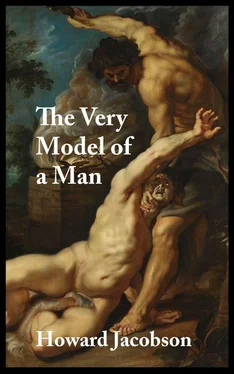But On is oblivious, oiled in his own sweat, too pliant, too slippery, too comfortable, to be thrown from his mattress. No matter how steeply it rears, it cannot toss him. Resolved not to be denied, the bed gives up its convulsions, makes for the opening in the tent, and proceeds at an even but determined pace towards… towards what?
Now she sees it! The fissure, the hole, the nothingness, the unseamed desert smoking crimson like Gehenna, another Red Sea awash this time with Israel’s children, not Egypt’s. But brought up short at her threshold, stopped dead at her feet — a lake of bodies lapping at her shore.
And — oh God! — On in his bed on his back, heading for the lake.
She thought she had saved him already with her unloosed hair. But Sisobk has a taste for placing women in exaggerated attitudes of devotion. And a hell-fire pit with a hog’s-bristle mattress hanging over it is too good an opportunity to let pass. He streams her beautiful black hair in the evil wind that blows from the chasm, hurls her on the teetering bed, and clasps her arms around its sodden cargo.
The barbers grow restive, wondering whether this is the best the fellow with no hair on his face is going to be able to do for them.
‘Hang on,’ Sisobk says, ‘I haven’t finished yet.’
*
The first light of morning sees the bed and its occupants still poised above the precipice, half off the cliff, half on it, and only the weight of a pin holding the balance between deliverance and damnation.
The cries of Korah’s company have not yet died away. Nor the screams of their animals. Nor the reverberations of their every last pot and pan as they rattle down to hell.
It may be these sounds which wake On to his new surroundings. He rubs his eyes — wishing as always that his hands were wet sponges — looks around him, spits, and beholds his wife clinging piteously to his legs, her own legs streaming out behind her in space, like coat-tails.
‘I’m not telling you again,’ he says. ‘You know the rule. No gazing at me with love first thing in the morning.’
And he kicks out…
The barbers look up from their finger-nails.
‘Men!’ they say.
‘And when do you reckon all this happened?’ they ask him. ‘About a thousand years from now,’ Sisobk says. This is Babel and these are barbers. Prophets are nothing new in this shop.
‘If you can tell the future, tell ours,’ they say. They are still listless, still sitting on the floor amid the clippings like broken dolls, still raising and lowering the hems of their pantaloons.
‘Go on,’ they say, ‘tell ours.’
Sisobk explains that it isn’t quite so easy. ‘First I have to know more about you. What your names are. How old you are. Where you come from.’
*
‘We come from Sodom,’ they tell him. ‘Heard of it?’
Veins break in Sisobk’s face. His little eyes wrinkle like dried fruit.
‘Never,’ he says. ‘But I’m sure your future will be a long and happy one.’ And he is off, out of the shop, down the street and round a corner, before the men of Sodom can make their little mouths at one another.
‘Do we have to sit outside?’ Preplen asks.
‘I need a sherbet,’ Cain says. ‘And I need breeze.’
They are in an open square, enclosed on all sides by white-stepped temples, the vast expanses of stone relieved by orange trees and fluttering pavilions of striped cloth.
‘What I like about it here,’ Cain says, ‘is that we could almost be by the sea.’
Preplen shudders.
Splintered by leaves, an early evening light the colour of honey patterns their arms. Preplen starts, fearing that his skin has erupted in impetigo. Then he searches the sky. ‘To be frank with you,’ he says, ‘I’m frightened of birds.’
‘Frightened of them as portents or frightened they’ll attack you?’
He pulls his head down into his shoulders. ‘Why split hairs?’
‘Are you frightened of any in particular?’
‘What do you mean, in particular? A bird’s a bird isn’t it — just as a foot’s a foot.’
Cain looks up. A solitary pelican glides above them on currents of warm air. It circles aimlessly, the same colour as the ziggurats, offering its belly deliciously to whoever will look at it. He thinks of Semyaza. ‘No,’ he says. ‘There are birds and birds.’
Preplen darkens his face. ‘You haven’t turned into some sort of nature lover or seasonalist since you left home, have you?’ he asks. ‘You aren’t telling me you’ve picked up a fertility thing and spend your time bowing down to vines and cereals.’
‘I don’t bow down to anything,’ Cain says. ‘Not even partridges.’
Preplen looks alarmed. ‘What’s a partridge?’ he wants to know.
‘A bird.’
‘So why would anybody bow down to a bird?’
Cain lets his eyes wander from temple to temple. ‘You’re asking the wrong person,’ he says. ‘But those who are smitten with the partridge claim great versatility for it. They say, for example, that a cock-partridge can impregnate a hen-partridge with just the sound of his voice. He can skirl his seed into her — skI E R R R R R Rek!’
Preplen covers his mouth. ‘Birds!’ he says. He looks as though he might easily retch. ‘Birds!’
‘Nor does its versatility end there. Those who are smitten maintain that cock-partridges console themselves with a round of sodomy while their womenfolk are on the eggs.’
This time, just to be on the safe side, Preplen leaves the table and takes a turn, hobbling like an old man, around the sherbet cart. He is careful to keep his head down. He returns only when he thinks he’s strong enough to be told precisely what kind of holiness, what species of numen, these Partridgists divine in their divinity.
‘I fear there’s something you’ve not grasped about the zoomorphic imagination,’ Cain tells him. ‘Holiness hardly enters into it. What the lascivious partridge provides for its congregation is, firstly, a good dinner — easy to catch you see, while it’s skierrrrrreking and sodomising — and thereafter an excuse for a riotously imitative dance.’
‘Imitative of the partridge?’
‘What else?’
‘And they call this religion?’
‘What else?’
‘Listen,’ Preplen says suddenly, propelling himself across the table and taking Cain’s wrists, ‘why don’t you leave this place? Why don’t you go home?’
Cain makes no attempt to free himself. He looks at the hands that hold him. Old hands? Young hands? He doesn’t know. But they are yellow, unhealthy hands.
A flock of cranes passes overhead. There are men in Babel who faint at the beauty of cranes in flight. They faint professionally. To please audiences. It occurs to Cain that they might be out there dropping on the river banks this very moment. Their fall cushioned by soft mosses, their colour coming and going, a breathing waxen, like Abel’s. For Abel, too, was a fainter.
But for Preplen the cranes’ high honking triangular flight is an abomination, a danger to him personally, an affront to the single Godhead, and worst of all, an obstacle to the unfolding of his opinions.
‘This is no place for you,’ he continues. ‘I know you… you won’t fight. You won’t stand up for yourself. You don’t want them to see how extreme you are. You want to smooth it all out for them, make it shapely, make it elegant, conceal what is the truth: that you strove extremely and then fell out extremely with an extreme God…’
Cain interrupts him, pointing to the cranes. ‘Oughtn’t you, as a poet —?’
‘Oughtn’t I to be writing odes to fowl?’ Preplen’s head has sunk into his shoulders again, as though that is its preferred and natural way of growing, a flower without a stalk. ‘No. I’m not that sort of poet. I leave that to your friends. Your blue-blood worshippers of the Holy Goat. Those Partridgists I wish you’d never told me about. I do something else. I curse. I course. I run around the object of my contempt. I copy him. I mimic him. I confound him. And by these means I bring him down.’
Читать дальше











